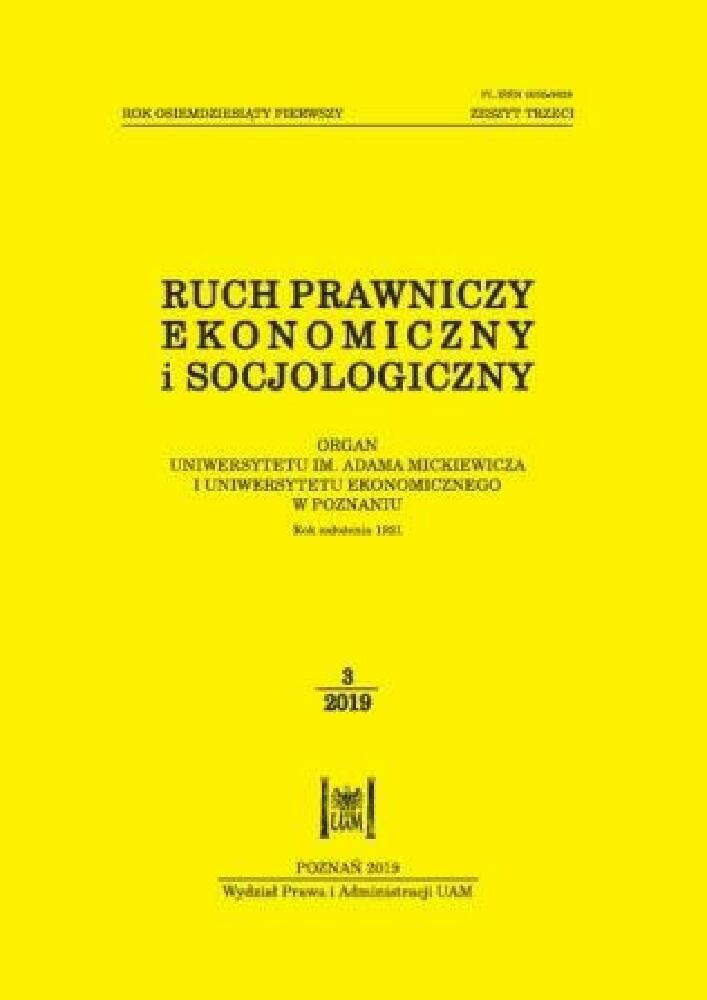Abstract
Political, economic, civilizational and social changes in the last few decades have led to a global anomie, and in this reality it was possible for the ideology of disruption to arise. If society were not immersed in the process of decomposing existing normative regulations, such marketing of quasirevolutionary ideas would be doomed to failure. Undermining the sense of normative regulation of goals and replacing them with new ones (surrounded by a false myth of improving the world) is an example of anomie used to maximize profits (not only in the financial sense). Simultaneously, two new mechanisms of social control have been developed and consolidated – control through emotions and control through the creation of illusions. This text is a preliminary attempt to analyse the above phenomena and processes.References
Anderson, E. (1995). Value in Ethics and Economics. Cambridge.
Barber, B.R. (2008). Skonsumowani. Jak rynek psuje dzieci, infantylizuje dorosłych i połyka obywateli. Tłum. H. Jankowska. Warszawa.
BBC (2017). Secrets of Silicon Valley. London.
Berger, P.L., Luckmann, T. (1983). Społeczne tworzenie rzeczywistości. Tłum. J. Niżnik. Warszawa.
Bernburg, J.G. (2002). Anomie, social change and crime: a theoretical examination of institutional-anomie theory. British Journal of Criminology 42(4): 729–742.
Besnard, P. (1990). Merton in search of anomie, [w:] J. Clark, C. Modgil, S. Modgil (eds.), Robert K. Merton: Consensus and Controversy. London: 243–254.
Blank, S. (2010). Why Startups Are Agile and Opportunistic – Pivoting the Business Model. www.steveblank.com.
Bower, J.L., Christensen, C.M. (1995). Disruptive Technologies: Catching the Wave. Harvard Business Review 1: 43–53.
Carr, N. (2012). Płytki umysł. Jak internet wpływa na nasz mózg. Tłum. K. Rojek. Gliwice.
Christensen, C.M. (1997). Innovator’s Dilemma: When New Technologies Cause Great Firms to Fail. Boston.
Christensen, C.M., Raynor, M.E., McDonald, R. (2015). What is disruptive innovation? Harvard Business Review 12: 44–53.
Colombo, M.G., Piva, E. (2008). Strengths and weaknesses of academic start-ups: a conceptual model. IEEE Transactions on Engineering Management 55(1): 37–49.
Dąbrowski, A. (2014). Czym są emocje? Prezentacja wieloskładnikowej teorii emocji. Analiza i Egzystencja 27: 123–146.
Davila, A., Foster, G., Gupta, M. (2003). Venture capital financing and the growth of start-up firms. Journal of Business Venturing 18: 689–709.
Durkheim, E. (2005). Suicide: A Study in Sociology. London–New York.
Głos, A., Załuski, W. (2016). Emocje negatywne a racjonalność decyzji. Zagadnienia Filozoficzne w Nauce 60: 7–33.
Griffiths, M.D. (2005). A ‘components’ model of addiction within a biopsychosocial framework. Journal of Substance Use 10(4): 191–197.
Grzywa, A. (2010). Manipulacja. Kraśnik.
Grzywa, A. (2012). Potęga manipulacji. Lublin.
Jarymowicz, M., Imbir, K. (2010). Próba taksonomii ludzkich emocji. Przegląd Psychologiczny 53(4): 439–461.
Kask, J., Linton, G. (2013). Business mating: when start-ups get it right. Journal of Small Business and Entrepreneurship 26(5): 511–536.
Landrowski, J. (2002). Biologiczne mechanizmy stresu, [w:] A. Bilikiewicz, S. Pużyński, J. Rybakowski, J. Wciórka (red.), Psychiatria. Tom 1: Podstawy psychiatrii. Wrocław: 172–190.
Mączyńska, E. (2014). Anomia – jej przyczyny i ekonomiczne następstwa, [w:] S. Drzyżdżyk, M. Gilski (red.), Oblicza mądrości. Z czego wyrastamy, ku czemu zmierzamy. Kraków: 77–106.
Messner, S.F., Rosenfeld, R. (1994). Crime and the American Dream. Belmont.
Messner, S.F., Rosenfeld, R. (1997). Markets, morality, and an institutional-anomie theory of crime, [w:] N. Passas, R. Agnew (eds.), The Future of Anomie Theory. Boston: 207–224.
Messner, S.F., Thome, H., Rosenfeld, R. (2008). Institutions, anomie, and violent crime: clarifying and elaborating institutional-anomie theory. International Journal of Conflict and Violence 2(2): 163–181.
Morańska, D., Jędrzejko, M. (2013). Cyfrowi Tubylcy – socjopedagogiczne aspekty nowych technologii cyfrowych. Warszawa.
Orru, M. (1987). Anomie: History and Meanings. Boston.
Passas, N. (2000). Global anomie, dysnomie, and economic crime: hidden consequences of neoliberalism and globalization in Russia and around the world. Social Justice 27(2): 16–44.
Pawlaczyk, B. (2010). Rola hormonów w regulacji homeostazy organizmu człowieka. Homines Hominibus 6: 7–20.
Reiss, A.J. (1951). Delinquency as the failure of personal and social controls. American Sociological Review 16(2): 196–207.
Ries, E. (2017). The Startup Way. How Modern Companies Use Entrepreneurial Management to Transform Culture and Drive Long-Term Growth. New York.
Sanbonmatsu, D.M., Strayer, D.L., Medeiros-Ward, N., Watson, J.M. (2013). Who multi-tasks and why? Multi-tasking ability, perceived multi-tasking ability, impulsivity, and sensation seeking. PLoS One 8(1): e54402. DOI:10.1371/journal.pone.0054402.
Siemaszko, A. (1993). Granice tolerancji. O teoriach zachowań dewiacyjnych. Warszawa.
Skinner, B.F. (1969). Contingencies of Reinforcement: A Theoretical Analysis. New York.
Spender, J.C. (2014). Business Strategy: Managing Uncertainty, Opportunity, and Enterprise. Oxford.
Sztompka, P. (1967). Teoria kontroli społecznej. Kultura i Społeczeństwo 11(3): 131–149.
Teece, D.J. (2010). Business models, business strategy and innovation. Long Range Planning 43(2/3): 172–194.
Williams, P. (2013). Lawlessness and disorder: an emerging paradigm for the 21st century, [w:] M. Miklaucic, J. Brewer (eds.), Convergence: Illicit Networks and National Security in the Age of Globalization. Washington: 15–36.
Wrzesień, W. (1996). Realizacja funkcji kontrolnej w rodzinach wielkomiejskich. Roczniki Socjologii Rodziny 8: 165–190.
Wrzesień, W. (1997). Rola kontrolera w badaniach rodziny, [w:] R. Cichocki (red.), Teoria socjologiczna a możliwości praktyczne. Poznań: 227–236.
Wrzesień, W. (2003). Jednostka – rodzina – pokolenie. Studium relacji międzypokoleniowych w rodzinie. Poznań.
Wrzesień, W. (2009). Europejscy Poszukiwacze. Impresje na temat współczesnego pokolenia polskiej młodzieży. Warszawa.
Wrzesień, W. (2014). Modyfikacje wzorów socjalizacyjnych w rodzinie w czasach nałogowych konsumentów. Ruch Prawniczy, Ekonomiczny i Socjologiczny 76(3): 261–280.
Wrzesień, W. (2017). Współczesne oblicza anomii. Ruch Prawniczy, Ekonomiczny i Socjologiczny 79(4): 285–304.
Wymer, S., Regan, E. (2005). Factors influencing e-commerce adoption and use by small and medium businesses. Electronic Markets 15(4): 438–453.
License
Copyright (c) 2019 WPiA UAM

This work is licensed under a Creative Commons Attribution-NonCommercial-NoDerivatives 4.0 International License.





